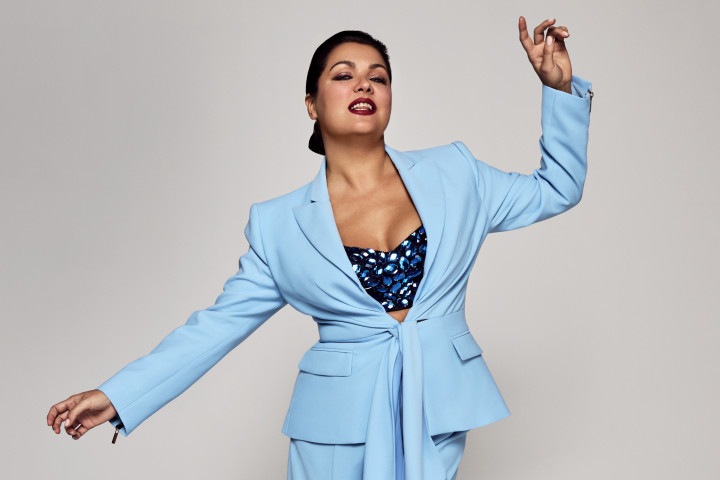Anna Netrebko – Donizetti: Don Pasquale

20.05.2011
Comic Abandon and Luscious Singing
With Norina in Don Pasquale and the title character of Lucia di Lammermoor, Donizetti and his librettists created utterly dissimilar heroines. Soprano Anna Netrebko has thrilled Metropolitan Opera audiences by incarnating both of these polar opposites with remarkable singularity. In Lucia, she is made mad by men. In Don Pasquale, the sanity of the men who desire Norina is a soccer ball she kicks about the playing field of the plot in pursuit of her goal – marriage to Ernesto, the young man she adores but whom she pretends to forsake. For a performer who commands a stage as Netrebko does, portraying a character that is not a victim but drives events forward is a diet rich in opportunities. With her luscious voice, beauty, and comic abandon, the soprano feeds us a banquet.
Stories like Don Pasquale’s have amused audiences since the days of Menander and Terence. But Otto Schenk, who directed this production, new in 2006, choreographs the performers’ antics so adeptly that characters who might be mistaken for stock instead captivate thanks to the vivid intensity of their emotions. The anger John Del Carlo’s Pasquale metes out to his nephew Ernesto when the young man insists on marrying not for money but for love emphasizes Schenk’s fidelity to psychological reality. The Don’s dilapidated mansion, so suggestively designed by Rolf Langenfass that one almost sees the roof leak, reinforces the notion that preserving his wealth is Don Pasquale’s lifework. Schenk reveals that by disinheriting Ernesto and taking a wife himself, Pasquale is embarking on a romantic folly that is also an intelligent investment. By contrast, Schenk and Langenfass make sure that our introduction to Norina, sunbathing on her terrace, informs us – before she has even sung a note – that she enjoys life as much as being on display. In other words: Watch out!
We expect a comedy to inspire laughter either at or with its characters. But when comedy also moves us to compassion, the elements of a familiar plot take on a different dimension. Don Pasquale, an opera about tricksters and trickery, tricks us, too. The lively opening measures of the overture – masterfully conducted here by Met Music Director James Levine – soon give way to a melancholy strain introduced by the cello. But the sparkling wit of the music – alternating with slightly portentous moments – leaves no doubt that the romp about to unfold will be clouded by nothing more bothersome than a sun shower. When Ernesto realizes that his uncle’s wedding plans make marriage to Norina financially impossible, his shock and grief, expressed in the soaring lines that begin his aria “Sogno soave e casto”, are not permitted to tug at our heartstrings as seriously as they might, thanks to Don Pasquale’s unsympathetic interjections, which amount to verbal and musical heckling. By encouraging the singers to perform in a broad comic style that is nonetheless believable, Schenk exploits Don Pasquale’s ability to deceive its audience. Thus, when a note of profundity is sounded, we are prepared for it – but the moment still takes us by surprise.
In league with Donizetti and his librettist Ruffini – who keep our feelings, other than delight, at arm’s length for two acts – Schenk hoodwinks us into believing that Ernesto is made of nothing but hot hormones; that Malatesta, Pasquale’s confidant, is a conniving deceiver of a credulous fool; that Norina is so unscrupulous that she sees Pasquale less as a man than as a tool with which to win Ernesto; and that the Don, at almost 70, fantasizing about fathering six children by a young woman who will love him for himself, is a buffoon. These characters are outlines without a conscience. There is no debate about the morality of their actions, no chiaroscuro that would draw us into their inner worlds. The characters are what they do – or so Schenk makes us believe.
The last act alters our perceptions. The lovers’ duet, with its tenderly intertwining lines, shines a spotlight on true, authentic emotions. Self-knowledge, for Pasquale and Norina, is bought at the price of a slap, one of opera’s most idiosyncratic employments of percussion, here brilliantly directed by Schenk. Norina realizes that her scheme has done wrong against an old man’s soul. In the same moment, Pasquale channels Falstaff, accepting that youth and its pleasures cannot be recaptured. He gives the lovers his blessing – and a fat allowance. His generosity and courage in embracing reality redeem his foolishness and make him lovable.
John Del Carlo’s robust Don, Mariusz Kwiecien’s Figaro-like puppet master Malatesta, Matthew Polenzani’s vocally beautiful Ernesto, and Anna Netrebko’s bombshell Norina make the most of Otto Schenk’s inventive, canny staging. Maestro Levine conducts Donizetti with the same reverence that informs his Wagner. Don Pasquale repays the favor by shining light on the human heart – and in so doing, lightens ours.
James Kuslan
5/2011
Mehr von Anna Netrebko